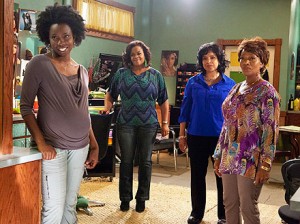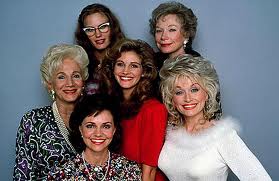The All-Black Steel Magnolias and Gay Male Reception
In the 1985 film adaptation of Alice Walker’s The Color Purple, the protagonist Celie says, “He beat me for not being you.” Celie’s realization that she will never be enough for her husband because he has always loved someone else is an apt way to enter a discussion of Lifetime TV’s forthcoming adaptation of Steel Magnolias. The 1989 theatrical version of the Robert Harling play has become a “gay classic,” according to Out magazine’s editors.
The twist with the 2012 made-for-television version is that, as People magazine puts it, “This time, the women at the core of the Southern story, set in the fictional Louisiana town of Chinquapin, will be played by Africa Americans.” Aside from the racial politics involved in casting African Americans actors in roles that were originally occupied by white actors (which has recently become a trend on Broadway, particularly with Tennessee Williams’ work including Cat on a Hot Tin Roof and most recently, A Streetcar Named Desire), this new Steel Magnolias seems to be getting beat by the gay blogosphere because it is not the 1989 theatrical version.
 On its pedigree, no one can claim that this “blackening” of a beloved gay text is in any way “slumming it” in production values and talent. Craig Zadan and Neil Meron, the team behind the Oscar-winning adaptation of the musical Chicago, are producing the telefilm with direction by Kenny Leon, the acclaimed director of the television adaptation of Lorraine Hansberry’s A Raisin in the Sun. The film stars Queen Latifah, Phylicia Rashad, Alfre Woodard, and Jill Scott–together having won and/or been nominated for a slew of music, film and television acting awards. To borrow and paraphrase the New York Post‘s 1969 Stonewall Riot headline, why are the blogsphere’s queen bees stinging mad? What might lead OMG Blog to begin a piece on the debut of the telefilm’s trailer by incredulously asking, “Who told Lifetime it was okay to remake Steel Magnolias?!”
On its pedigree, no one can claim that this “blackening” of a beloved gay text is in any way “slumming it” in production values and talent. Craig Zadan and Neil Meron, the team behind the Oscar-winning adaptation of the musical Chicago, are producing the telefilm with direction by Kenny Leon, the acclaimed director of the television adaptation of Lorraine Hansberry’s A Raisin in the Sun. The film stars Queen Latifah, Phylicia Rashad, Alfre Woodard, and Jill Scott–together having won and/or been nominated for a slew of music, film and television acting awards. To borrow and paraphrase the New York Post‘s 1969 Stonewall Riot headline, why are the blogsphere’s queen bees stinging mad? What might lead OMG Blog to begin a piece on the debut of the telefilm’s trailer by incredulously asking, “Who told Lifetime it was okay to remake Steel Magnolias?!”
As a gay viewer myself, there is nothing inherently ghastly about this telefilm’s trailer. I argue that it is being trashed in the popular gay discourse because it is not the beloved 1989 “gay classic.” On the blog Joe.My.God, commenter “Elsewhere” concedes that he is unsure whether or not he will watch the telefilm because “the original film was imprinted on my (somewhat younger) gay brain with such ferocity that I love it more than my luggage” works to illuminate the ways in which the memory of Steel Magnolias and those that he presumably re-visits are too precious to disrupt by seeing other bodies in the roles. Another commenter “Jeremy” says, “I love me some Alfre Woodard and Mrs. Huxtable [Phylicia Rashad], but this just feels off. I don’t think you can remake a film that was originally done with three actresses that injected their HUGE personalities into their lines… To hear anyone else say the lines reminds you of the original and how much more superior it is.” The feeling of “offness” “Jeremy” feels seems to be rooted in its attempt to disrupt the way he remembers (and presumably re-lives, via DVD) Steel Magnolias. Additionally, I am not sure if this level of “offness” “Jeremy” feels can be traced to the notion that Steel Magnolias is being blackened. The telefilm is, after all, being billed not as simply a “remake of Steel Magnolias” but an “all-black remake of Steel Magnolias“, thus encoding its difference at the site of its industrial reception.
 Furthering a discussion of the place incredulous nature of a remake of this text, Out Magazine staffer Max Berlinger is “not OK with [this remake] on so many levels… [because] Shirley MacLaine and Dolly Parton’s performances are so utterly perfect I’m flabbergasted that anyone would think this is a good idea. I mean, I’ll watch it, but I won’t be happy.” Berlinger in some ways crystallizes the tension some gay fans of Steel Magnolias feel. On one hand, they fully want to reject the text because it is not the theatrical (and most widely available) version of the text. On the other hand, because Steel Magnolias feels like it is a text “owned” by gay men, some are overcome by a desire to consume this (queered) text in any incarnation made available.
Furthering a discussion of the place incredulous nature of a remake of this text, Out Magazine staffer Max Berlinger is “not OK with [this remake] on so many levels… [because] Shirley MacLaine and Dolly Parton’s performances are so utterly perfect I’m flabbergasted that anyone would think this is a good idea. I mean, I’ll watch it, but I won’t be happy.” Berlinger in some ways crystallizes the tension some gay fans of Steel Magnolias feel. On one hand, they fully want to reject the text because it is not the theatrical (and most widely available) version of the text. On the other hand, because Steel Magnolias feels like it is a text “owned” by gay men, some are overcome by a desire to consume this (queered) text in any incarnation made available.
Certainly, there are voices who, like Joe.My.God commenter “Pepe” asserts that he will watch Steel Magnolias if only “for the opportunity to watch Ms. Rashad, Ms. Woodard, Ms. Queen and Ms. Scott all in the same room at the same time” or Advocate.com reader Scott Amundsen who concedes that the “trailer looks like it isn’t too bad.”
But the proof will be in the ratings pudding. While Lifetime has not yet announced an airdate for the telefilm, the success (or failure) of this remake will be determined by how many people actually tune in to watch. The fact is, there are some gay men who will tune in to watch and enjoy the telefilm on its own merits while others have already decided to hate this remake because its biggest crime is the failure to be the 1989 theatrical version.



This is a fascinating discussion Al. I appreciate it’s deeper considerations of the profound imprinting of a beloved texts and its impact on future consumptive practices. This is so much more nuanced than “they’ll hate it because it’s black,” which unfortunately has been the dominant discourse when considering the remake… Now with that in mind, if we turn back to considerations of race and this notion of “offness” I’m curious about what the reaction would be if someone decided to remake the Cosby Show with an all white cast. Would the same bloggers decide there was something “off” about that or would they celebrate the reboot/reworking/expansion of that beloved text? How much of the discomfort is racial and how much is historical? Interesting piece.
The original play takes place solely in the beauty shop, and the film was a completely new haircut from that play, so it’s possible and likely that the new film will also be very different from the 1989 version and therefore bit a remake at all.
I would so love to see the Steel Magnolias pilot CBS ran in 1990 and hear their thoughts on that.
I think my biggest issue would be in Queen Latifah playing M’Lynn as you say. That just doesn’t work in my head. Alfre would have been a much better choice. But who knows.
The most affecting thing I ever learned about Steel Magnolias is that the writer’s mother (it’s based on his life) was in the room in the scene where the (actual doctors) pull the plug and turn off the machines because “she wanted to see Julia get up and walk away.” Heart breaking!